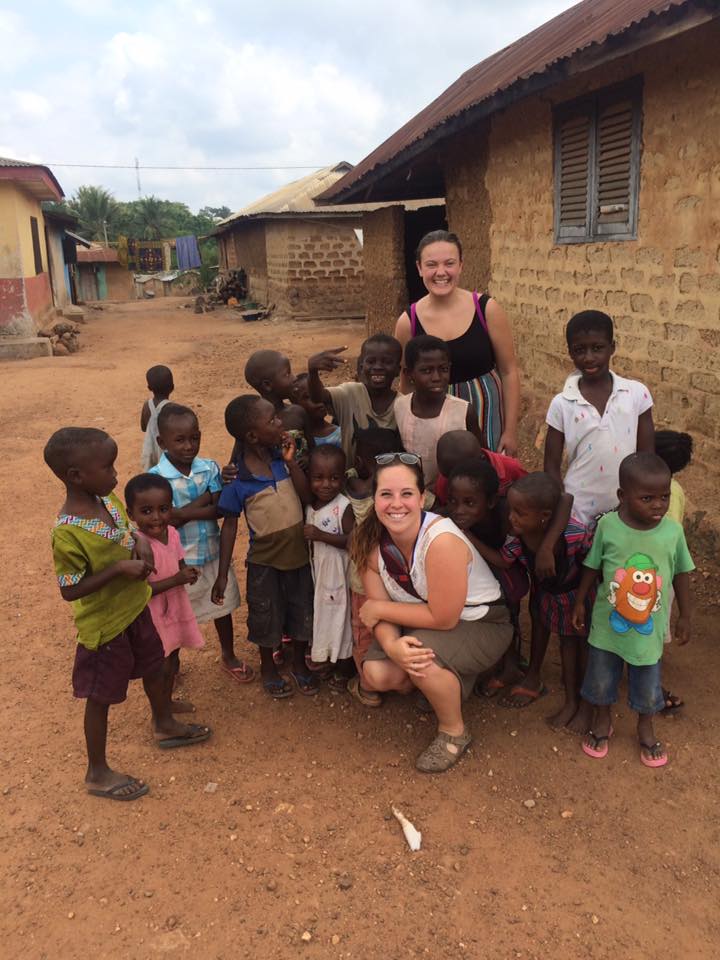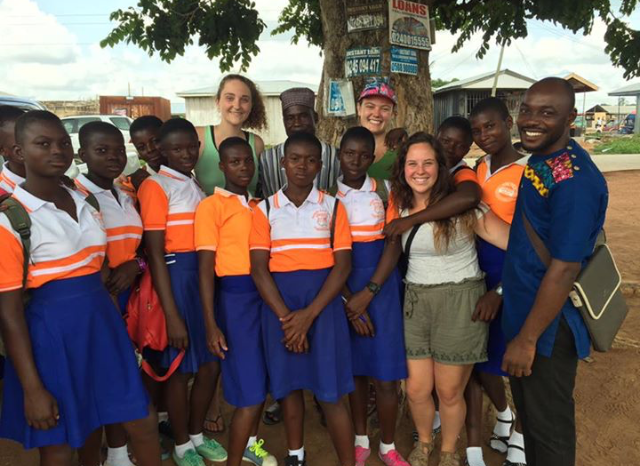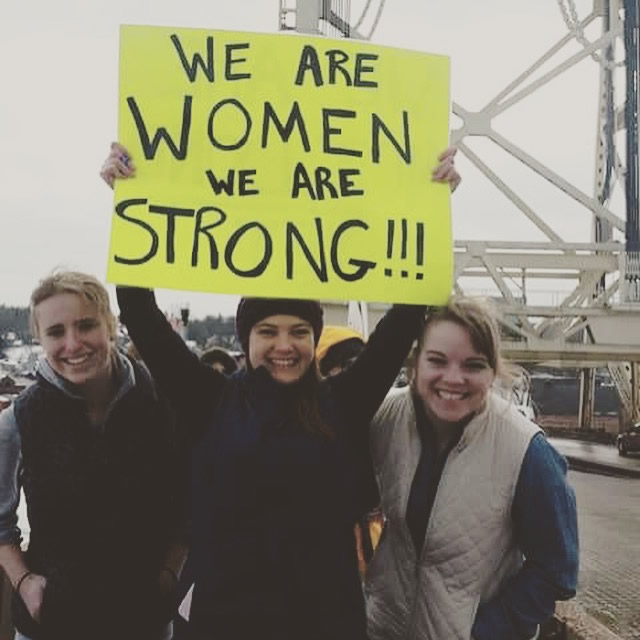By Amy Karagiannakis

In many developing countries, the subject of menstruation is still very much taboo. Many parents will not discuss menstrual hygiene with their daughters, which can lead to embarrassment and confusion. Without access to sanitary pads, many women use items such as newspaper, rags, and other materials that are not very efficient at absorbing and can cause infection. Girls will often miss several days of school each month while they are on their period to avoid the potential embarrassment of staining their clothes due to leakage. According to the United Nations Educational, Scientific and Cultural Organization (UNESCO), approximately 10% of African girls will quit school due to issues regarding menstruation. There are solutions available, but making them accessible to small villages is difficult.
Erin Richie traveled to Ghana last summer with a cohort of students from the Global Leadership Pathway within the Pavlis Honors College. The team worked on numerous projects while in country, but Erin took the lead on the Women’s Health and Education project. Before leaving for Ghana, Erin first reached out to Diva Cup for donations. Diva Cup manufactures reusable menstrual cups that last several years and can be cleaned and sanitized using boiling water. The company agreed to donate 50 cups, as well as designed posters explaining proper care and use. Erin wanted to do more though. She new that 50 cups, while helpful, would eventually run out. Erin wanted to provide an alternative for the girls and women in the Ghanaian village that they could continue to utilize even after she had left.
Using simple, low cost materials, Erin modified a pattern for a reusable menstrual pad that could be washed and then sun bleached. She wanted to offer workshops to teach girls and women how to make their own reusable menstrual pads providing the necessary materials. Through a connection with the nonprofit organization Women of the Pearl, Erin partnered with a local pastor and his wife in Ghana. The couple believed that when women are empowered, their children will prosper. They were very excited about the project and helped Erin solidify a location for her first workshop. The initial workshop was a success and the turn out was very encouraging. The demand for more workshops grew and Erin spent much of her time in country holding these workshops and teaching local women how to facilitate their own. These women could now make their own affordable, reusable pads, allowing them the protection to stay in school during their monthly cycle.

Human centered design takes into account the human perspective in all steps of the problem-solving process. Immersing oneself with the problem in the community in order to gain context of the issue at hand can be very effective to identifying solutions. Erin observed that young women in this small Ghanaian village were missing a significant amount of school each month due to not having access to personal hygiene products. Once the problem was identified, she was able to conceptualize and develop a solution. Once the reusable menstrual pad was produced with these particular young women in mind, Erin designed and implemented a workshop in country to teach them how to make their own.
“I’m so thankful for all that I’ve been able to do by being involved with the Pavlis Honors College. Aside from learning about the culture, my time in Ghana also taught me how to be a better problem solver. I’m so lucky to have had a great supportive team in Ghana and for all I was able to learn from them that I can apply to future experiences, as teamwork is not only an intricate part of becoming an engineer, but a valuable life skill,” reflected Erin. The next Pavlis Honors College Ghana team will be traveling this summer. They are currently raising money to purchase more materials and supplies to continue teaching Erin’s workshops in local villages. Donations to this and other causes can be made through Superior Ideas, a Michigan Tech crowdfunding site.

Erin returned from her immersion experience in Ghana a little less than a year ago, but her devotion to women’s health and education has only grown stronger. She will be spending two weeks this summer volunteering in Uganda with Women of the Pearl to continue her work, as well as contribute to other projects that empower women around the globe. Prior to her trip to Uganda, Erin will be studying abroad for six weeks in Peru to participate in some volunteer work and finish up her minor in Spanish. She will be living with a host family while in country, and hopes to find some time to visit Machu Picchu, Ica, and Iquitos. Erin will be graduating at the end of Fall semester 2017 with a degree in Mechanical Engineering and minors in Spanish and Psychology.

Erin’s interest in human centered design did not originate in Ghana. As a mechanical engineering major, Erin is passionate about designing and developing products that make daily work and life more efficient and enjoyable. Erin is currently leading the Human Factors Team for the Humane Interface Design Enterprise (HIDE) at Michigan Tech. HIDE is a student-run organization focused on software development and usability research. Erin is now working with the Undergraduate Student Government to develop an RFID voting booth in order to increase student involvement in surveys and elections. Starting in the Fall, Erin will become the co-president of HIDE.
Erin Richie is an active Honors Ambassador and works as an academic success coach on campus, as well as off campus as an elementary school STEM instructor through the GLRC. She was recently awarded the Pavlis Honors College Dean’s Scholarship in the amount of $1000. Erin is the first recipient of this award, which was created to recognize Honors students like Erin who go above and beyond. The Pavlis Honors College Dean’s Scholarship will be awarded to one honors student annually in the amount of $1000 to recognize their outstanding commitment to our programs and pathways. Erin consistently volunteers her time to design, plan and implement recruitment efforts to grow the PHC community. She has taken a leading role to ensure the successful implementation of ideas and events. She goes above and beyond to engage with students and faculty on a meaningful level and continues to have a significant positive effect on College enrollment. Erin is passionate about human centered design and plans to pursue a master’s degree in Applied Cognitive Science and Human Factors at Michigan Tech following her undergraduate education in Mechanical Engineering.